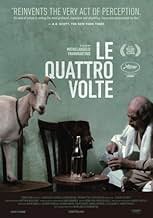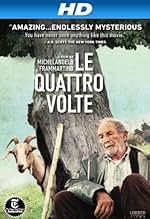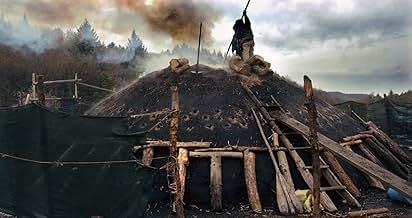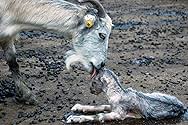An old shepherd lives his last days in a quiet medieval village perched high on the hills of Calabria, at the southernmost tip of Italy. He herds goats under skies that most villagers have d... Read allAn old shepherd lives his last days in a quiet medieval village perched high on the hills of Calabria, at the southernmost tip of Italy. He herds goats under skies that most villagers have deserted long ago. He is sick, and believes to find his medicine in the dust he collects on... Read allAn old shepherd lives his last days in a quiet medieval village perched high on the hills of Calabria, at the southernmost tip of Italy. He herds goats under skies that most villagers have deserted long ago. He is sick, and believes to find his medicine in the dust he collects on the church floor, which he drinks in his water every day.
- Director
- Writer
- Stars
- Awards
- 14 wins & 14 nominations total
- Director
- Writer
- All cast & crew
- Production, box office & more at IMDbPro
Featured reviews
Three burials of recycled time
The difference between one that works and others, which is the difference between meditation and sleep, is how well the filmmaker structures. It's not enough to convey an empty room, there has to be somehow someone there who is just a few words short of self and the room still being empty.
The structure here is that we have three worlds, three burials (four, if we listen to the filmmaker). Dissolution of one means birth in the next, and the whole is being spun because we breathe in the world of the film. In between we get the transient flow of things simply being themselves. We get rituals of living that pass the time, from the absurd Roman parade to sweeping a church floor to herding and playtime among baby goats, rituals about the passing of time like the one with the tallest tree cut down and erected as the center of a ceremony then symbolically cut down again, and our film as a ritual that reflects both kinds of passing.
Its function is like the mandala of Tibetans, a space where you still the mind until you begin to notice more than painted symmetry. From passing time to observation about the passing.
I would have preferred a little less quirkiness from Tati in the individual parts and a little more purity but that is a minor complaint. If you like this, look out for a guy called Ben Rivers.
The end is not an end in the classical sense and only recycled being, another mandala here. But you have to see it. What is the smoke of burned trees blowing out to the forest but transformation, the forest returning to itself? There's a beautiful Zen saying about this.
Le Quattro Volte is a beautiful document
Cycle of Life in the Mountains of Italy
My score is more accurately a 7.8/10
A village, its inhabitants and their goats
The title refers to the four seasons and the story follows a cycle of birth, death and rebirth. There is a symmetry in the film, and each part focuses on the fate of one individual (a farmer, a goat and a tree, for instance).
The film makes effective use of the beautiful landscape of Calabria, and the old, ramshackle village. The setting is perhaps in itself the main character of the film. Humans are often viewed from above, and we are in a sense getting the "God" treatment.
There is barely any plot or a story to speak of, yet we go through stages of life that are eternal and inevitable - and we are reminded again and again that all things must pass.
There are life-like documentary aspects to this feature. The film is shot in available light with amateur actors and animals that will endear you. The result is breathtaking and inspiring. The sound scape is also rich: it helps create an emotional journey through every chapter of the film.
I can highly recommend this to anyone interested in unusual films with no dialogue or discernible plot, but anyone also will no doubt be captivated by it's gorgeous setting, it's humble characters or the feeling of watching life pass, unfiltered.
Beautiful, touching film
Did you know
- TriviaThe film is comprised of long takes. One of them lasts an astounding 8 minutes.
- Crazy creditsThe end credits also include a silver fir, the goats of Caulonia and the coal of Calabria among the cast members.
- ConnectionsFeatured in Ebert Presents: At the Movies: Episode #1.15 (2011)
- How long is Le Quattro Volte?Powered by Alexa
Details
- Release date
- Countries of origin
- Official site
- Language
- Also known as
- The Four Times
- Filming locations
- Production companies
- See more company credits at IMDbPro
Box office
- Gross US & Canada
- $152,530
- Opening weekend US & Canada
- $16,192
- Apr 3, 2011
- Gross worldwide
- $717,918
- Runtime
- 1h 28m(88 min)
- Color
- Sound mix
- Aspect ratio
- 1.85 : 1






















